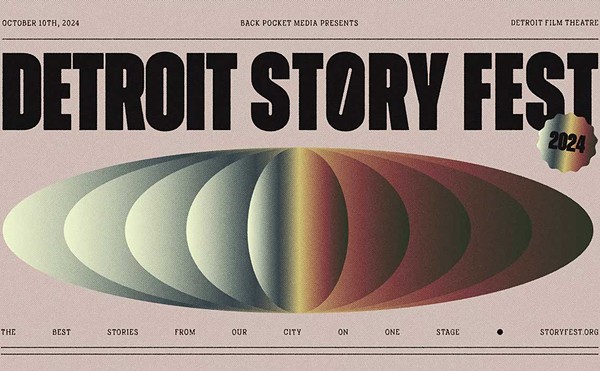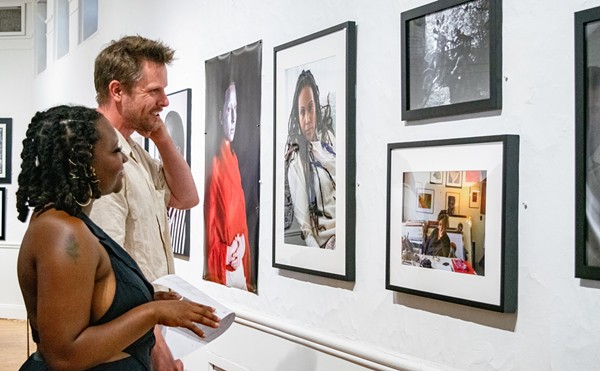The dream of becoming a dancer led Aku Kadogo away from Detroit a year after graduating from Cass Tech High School. After more than three decades of achieving that dream and numerous others — more than most would dare to dream — she returned home to teach another generation what she had garnered.
"I tell my students they're going to be the next pros. You are next in line," says Kadogo, director of the Black Theatre Program at Wayne State University.
Kadogo, then Karen Vest, left Detroit in 1973 to study at New York University. By 1976 she was performing in the off-Broadway — and subsequently on-Broadway — production of Ntozake Shange's groundbreaking For Colored Girls Who Have Considered Suicide When the Rainbow Is Enuf. Two years later, after a brief interlude in Brazil, she was off to Sydney, Australia, for another production of the play. She ended up staying down under and taught with the Aboriginal Islander Dance Theatre for 10 years, and for one year at James Cook University, Queensland. In 1998, Kadogo became associate choreographer for an Australian production of the rock opera Rent. She worked with various touring productions of the show — with a 2000 interlude as a choreographer at the Sydney Olympics — until 2006 when she joined the WSU theater program. But she'd hardly lost touch with the city in the meanwhile.
"In 1996, I saw the Heidelberg Project," she says. "I wanted to know who created this. Ron Milner [the late Detroit playwright, director, etc.] introduced me to Tyree Guyton. I said, 'Hello, would you like to come to Sydney?' In 2004, Tyree was in Sydney on a project I created with him. Then I thought, 'This guy's come in my life to being me back to Detroit. I'm going home.'"
Kadogo is a vastly different woman than the teenager who left here so long ago, but then Detroit is a vastly different city than the one she left. She welcomed the opportunity to spend time close to her parents, arts activists Don and Hilda Vest, but she was troubled by the run-down cityscape.
"I wept for a year," she says. "I would pull my car over sometimes and weep. Seeing black people walking so slowly was a sad thing to me. The energy that fired my imagination, a diversity of teachers in church, school and the neighborhood that had nurtured me was gone. Things were slow-moving and devastated on the one hand, but I thought to myself, you're older and you changed; this place is older and it's changed."
When Kadogo left, there was still money flowing through Detroit. The hard reality of industrial production moving to low-wage countries hadn't set in. The population hadn't thinned out; neighborhoods were more vibrant. The Russell Woods neighborhood where she grew up, near Dexter and Davison, was a solid working-class area that boasted its own art fair.
"My parents took us to every cultural thing in city," Kadogo says. "I remember my father taking me to a puppet show. That's vivid in my mind. I used to make up dances in our house when I was a little girl. I've been dancing since I could walk. It's a testimony to how I view culture in Detroit. People were dancing around me doing the Madison, the bunny hop. There was cultural movement around me."
Vaughn's Book Store, a gathering place for black cultural and political activists, nearby on Linwood Avenue, was just one of the cultural institutions of the era.
Since coming back, Kadogo has collaborated with poet Jessica care Moore, another star Detroit artist who went away for 12 years and came back. Kadogo worked with Moore on the multimedia program God is Not an American, that was commissioned by the Apollo Theater.
"Aku's energy pushed me to see my work at the level I needed in order to take my work where I felt in my body and spirit it had to go," Moore says. "She's become a coach and a mentor and friend to me. She's a living legend in my world."
More than her legend, it's her experience that gives her a perspective on the city. She sees what is possible and attainable for those with a dream and a willingness to work at it.
"I think Detroit is a really exciting place to be a young artist in right now," she says. "I tell my students if you think you want to start something up, start it up here."
Larry Gabriel is a writer, musician and former editor of Metro Times. Contact him at [email protected]





